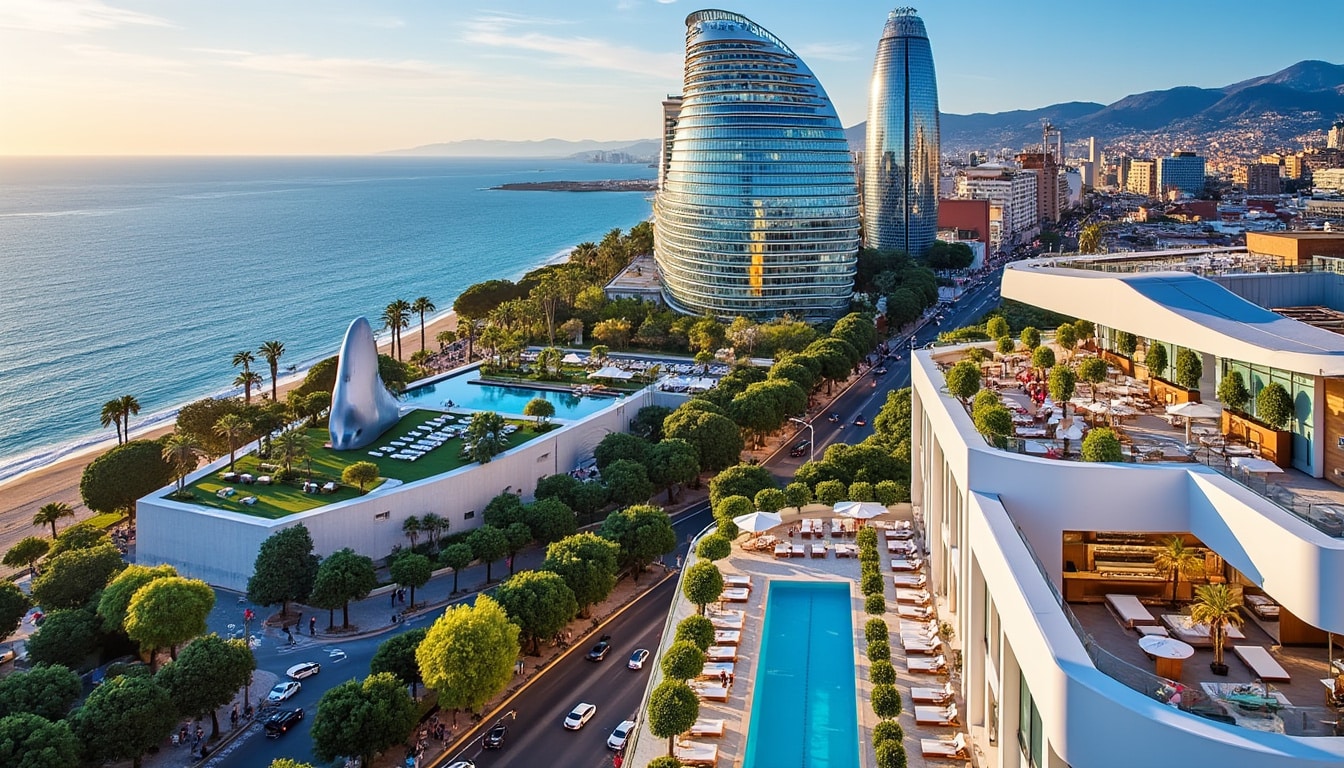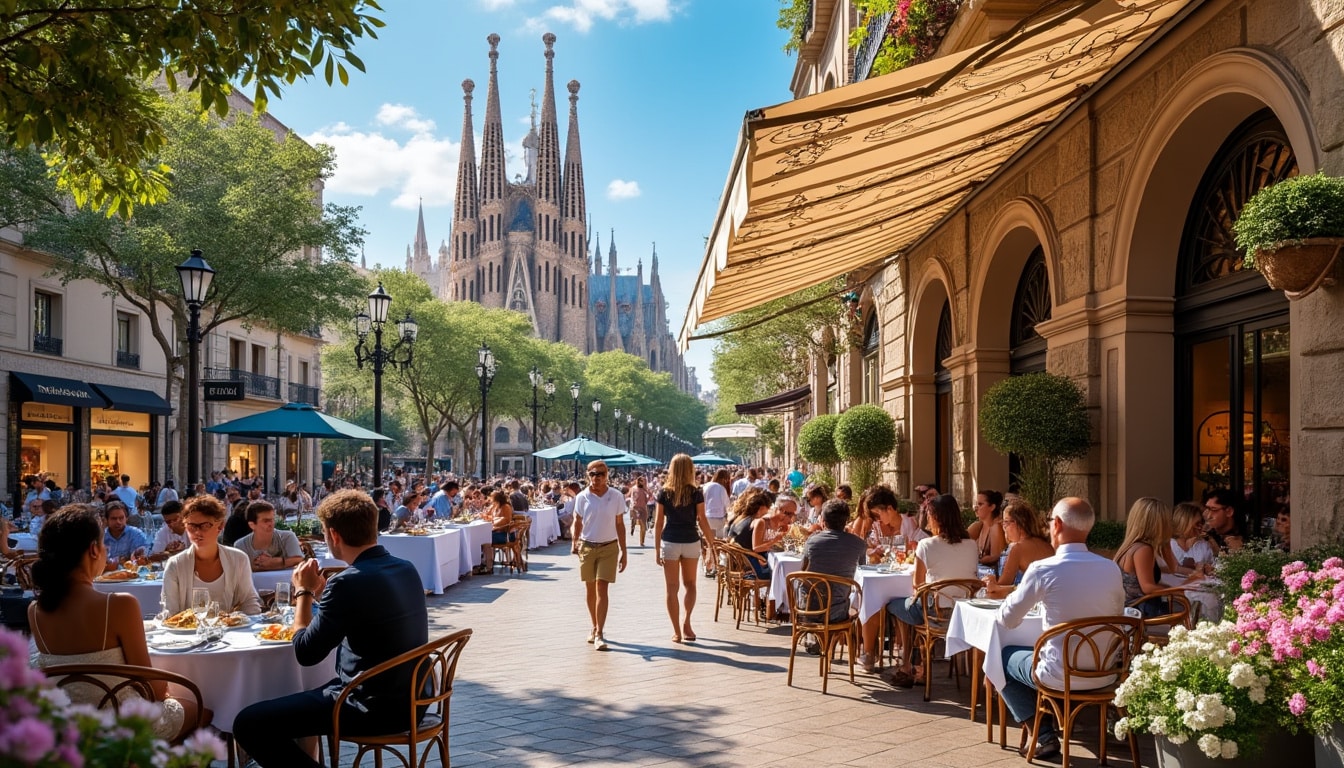Barcelona, a city known for its stunning architecture and vibrant culture, often leaves travelers wondering: just how expensive is it to visit? As a hotspot for tourism, Barcelona can seem daunting to the budget-conscious traveler. But fear not, this enchanting city offers a range of options suitable for every wallet, from luxurious experiences to more frugal adventures. Whether you’re planning to marvel at Gaudí’s masterpieces, indulge in local cuisine, or enjoy the lively nightlife, understanding the cost landscape can significantly enhance your visit. Below, we’ll explore the key factors that may impact your budget while traveling to this Mediterranean gem in 2025.
Accommodation Costs in Barcelona
When it comes to accommodation in Barcelona, options abound, from budget-friendly hostels to luxury hotels. Overall, the average accommodation cost per night is around €98 for a single person in a double occupancy room, and about €196 for two people. However, these prices can vary greatly depending on the time of year.

The summer months, particularly July and August, see a spike in prices due to the influx of tourists. During this peak season, accommodation can average around €233 per night. To get the best deals, consider booking through platforms like Booking.com or Expedia, which often offer competitive rates, especially if booked well in advance.
Seasonal Fluctuations
Off-season, particularly from November to March, can see prices dropping to as low as €125 per night, providing significant savings for travelers willing to brave Barcelona’s cooler, though still mild, winter weather.
- ✨ Travel tip: Consider visiting during the shoulder season (April-June, September-October) for balanced weather and moderate prices.
- ✨ Use Airbnb for authentic, local experiences and potential savings, especially if traveling in a group.
- ✨ Don’t forget to look at Lastminute.com for any late deals if your travel dates are flexible.
| Season 🌞 | Average Cost per Night for a Double Room 💶 |
|---|---|
| Peak Season | €233 |
| Off-Season | €125 |
| Shoulder Season | €160 |
Transportation Costs in Barcelona
Navigating Barcelona is a breeze thanks to its efficient public transportation system, which includes buses, trams, and the metro. On average, travelers spend around €19 per day on local transport. Using public transit is not only economical but also a great way to experience the city like a local.
Individual metro tickets cost around €2.10 each, but savings can be made by purchasing a 10-trip ticket for about €7.80. Consider a travel pass if you plan to explore extensively. Options include the Hola Barcelona Travel Card, which offers unlimited journeys and can decrease your transportation expenditure if you use it frequently.
Cost-effective Travel Methods
While taxis and rideshares like Uber offer convenience, they are significantly more expensive than public transport. Prices vary based on distance and time, but it’s common to spend significantly more per trip compared to using the metro or buses.
- 🚇 Pro Tip: Purchase multi-day passes if you’re staying for a while and plan on using the metro frequently.
- 🚶♀️ Take advantage of the city’s pedestrian-friendly areas like the Gothic Quarter to save on transport costs.
- 🚌 Use the Barcelona Bus Turistic for an efficient and scenic way to cover major attractions.
| Transportation Option 🚍 | Average Cost per Trip 💰 |
|---|---|
| Metro Single Ticket | €2.10 |
| 10 Trip Metro Ticket | €7.80 |
| Taxi/Rideshare | Varies/Significantly More |
Dining and Food Costs in Barcelona
Barcelona’s culinary scene is rich and varied, offering something for every palate. On average, travelers spend about €58 per day on food, with costs varying according to your dining preferences. The city’s wide range of eateries means you can enjoy anything from high-end dining to delicious street food.
Restaurants along popular tourist areas can be pricey, but venturing into local neighborhoods can lead to more authentic and affordable experiences. Consider exploring guidebooks or checking out Barcelona’s best eateries for delicious yet affordable options.
Smart Eating in Barcelona
Taking advantage of lunch deals, known as ‘menu del dia’, can be a cost-effective way to enjoy a hearty meal, often including a starter, main course, dessert, and drink for around €10-€20.
- 🍽️ Try out local markets like La Boqueria or Mercat de Sant Antoni for fresh and affordable snacks.
- 🥖 Leverage free hotel breakfasts, especially when staying at Marriott or Hyatt locations.
- 🍷 Take one of the many food tours, such as a Tapas Cooking Class, to combine a meal with learning, gaining a deeper culinary understanding of Barcelona.
| Meal Time 🍽️ | Average Cost 💵 |
|---|---|
| Breakfast | €7-€20 |
| Lunch (Menu del Dia) | €10-€20 |
| Dinner | €20-€46 |
Sightseeing and Activities in Barcelona
Barcelona is home to an array of attractions, with costs varying based on the site and type of experience. On average, expect to spend about €33 per day on entertainment and entrance fees. Major attractions such as La Sagrada Família are must-see but come at a cost, with entry fees ranging around €26.
To extend your sightseeing budget, consider purchasing the Go City Barcelona Pass which offers entrance to multiple attractions at a discounted price. Don’t forget to take advantage of free attractions like Bogatell Beach and the Gothic Quarter.
Free and Affordable Activities
The beauty of Barcelona is that you don’t have to spend much to enjoy the city. Plenty of free experiences await, from wandering along Las Ramblas to exploring local neighborhoods. Check out this guide to budget travel tips in Barcelona for more insights.
- 🎟️ Visit museums free of charge on the first Sunday of every month across the city.
- 🏖️ Relax at one of Barcelona’s beaches, which are free to access and enjoy.
- 🕍 Explore historic sites such as the Gothic Quarter for its architectural beauty.
| Activity 🎟️ | Average Cost 💵 |
|---|---|
| La Sagrada Família | €26 |
| Parc Güell | €10 |
| Montjuïc Castle | €12 |
| Free Attractions (e.g., Gothic Quarter) | Free |
Nightlife and Entertainment Costs in Barcelona
The city’s nightlife is a highlight for many visitors, offering a vibrant mix of bars, clubs, and live music. The average expenditure on nightlife and drinks is around €17 per day. While Barcelona’s nightlife is generally more affordable compared to other European cities, inevitably, prices can vary depending on where you go.
Bars along the beach or in trendy districts like Eixample might charge more for drinks, but equally, they offer fantastic atmospheres. To manage costs, explore areas known for cheaper nightlife, or enjoy a few drinks at local bars before hitting higher-end clubs.
Insider Tips for a Night Out
To make the most of Barcelona’s nightlife, plan ahead and look for happy hours or entry deals to popular clubs. Using apps like LoungeKey can also help locate the best venues and offers.
- 🎉 Consider free-entry events or those offering free drink promotions to save money.
- 🍻 Spanish wines and beers are often cheaper local options compared to international spirits.
- 🚶♂️ Walking between venues within the night districts can save you on transport costs and let you soak up the vibe.
| Venue Type 🥂 | Average Drink Cost 💸 |
|---|---|
| Beachfront Bars | €10-€15 |
| Clubs | €15-€20 |
| Local Bars | €5-€10 |
FAQs About Costs in Barcelona
Here are some common questions about the cost of visiting Barcelona:
- Q: Is it cheaper to stay in a hostel or hotel in Barcelona?
A: Generally, hostels are more budget-friendly, with options available through platforms like Hostelworld, especially for solo travelers or backpackers. - Q: What are the best budget-friendly attractions in Barcelona?
A: Consider free attractions such as the Gothic Quarter, Las Ramblas, and browsing shops at Boqueria Market. - Q: How can I save on meals in Barcelona?
A: Eat at local markets, take advantage of ‘menu del dia’ lunch specials, and consider accommodations offering free breakfasts. - Q: What’s the best budget travel tip for Barcelona?
A: Use the metro for affordable travel, explore free attractions, and book accommodations during the off-peak season. - Q: Should I use ride-sharing apps?
A: Ride-sharing apps like Uber can be convenient but are costly compared to public transit.

